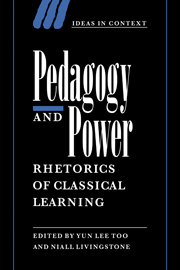Book contents
- Frontmatter
- Contents
- Notes on contributors
- Acknowledgements
- Introduction
- 1 Classics: from discipline in crisis to (multi-)cultural capital
- 2 Schoolboys and gentlemen: classical pedagogy and authority in the English public school
- 3 ‘Die Zung’ ist dieses Schwert': classical tongues and gendered curricula in German schooling to 1908
- 4 ‘What does that argue for us?’: the politics of teaching and political education in late eighteenth-century dialogues
- 5 Women and classical education in the early modern period
- 6 Pilgrimage to Parnassus: local intellectual traditions, humanist education and the cultural geography of sixteenth-century England
- 7 ‘Not so much praise as precept’: Erasmus, panegyric, and the Renaissance art of teaching princes
- 8 Teachers, pupils and imperial power in eleventh-century Byzantium
- 9 Reading power in Roman Greece: the paideia of Dio Chrysostom
- 10 Children, animals, slaves and grammar
- 11 A good man skilled in politics: Quintilian's political theory
- 12 The voice of Isocrates and the dissemination of cultural power
- 13 Xenophon's Cyropaedia: disfiguring the pedagogical state
- Select bibliography
- Index
- IDEAS IN CONTEXT
13 - Xenophon's Cyropaedia: disfiguring the pedagogical state
Published online by Cambridge University Press: 30 September 2009
- Frontmatter
- Contents
- Notes on contributors
- Acknowledgements
- Introduction
- 1 Classics: from discipline in crisis to (multi-)cultural capital
- 2 Schoolboys and gentlemen: classical pedagogy and authority in the English public school
- 3 ‘Die Zung’ ist dieses Schwert': classical tongues and gendered curricula in German schooling to 1908
- 4 ‘What does that argue for us?’: the politics of teaching and political education in late eighteenth-century dialogues
- 5 Women and classical education in the early modern period
- 6 Pilgrimage to Parnassus: local intellectual traditions, humanist education and the cultural geography of sixteenth-century England
- 7 ‘Not so much praise as precept’: Erasmus, panegyric, and the Renaissance art of teaching princes
- 8 Teachers, pupils and imperial power in eleventh-century Byzantium
- 9 Reading power in Roman Greece: the paideia of Dio Chrysostom
- 10 Children, animals, slaves and grammar
- 11 A good man skilled in politics: Quintilian's political theory
- 12 The voice of Isocrates and the dissemination of cultural power
- 13 Xenophon's Cyropaedia: disfiguring the pedagogical state
- Select bibliography
- Index
- IDEAS IN CONTEXT
Summary
The Persia of Xenophon's Cyropaedia is an important site of political pedagogy, providing a historical scenario for a ruler's education and then a reference point for subsequent sites of instruction in power. Cicero informs us that Scipio Africanus kept the Cyropaedia by his side to supply himself with an image (effigies) of just empire (Ep. Quintum I.I.23; also Ep. ad Fam. 9.25 and De Senectute 79–81). Later, Renaissance scholars regarded Xenophon's work as a prescriptive account of how to produce an ideal ruler of an ideal state, and prior to Machiavelli, as the most influential ‘mirror for princes’. Modern readers add their voices to this regard for the work, continuing to find in Xenophon's portrayal of Cyrus the Great and his career a paradigm of ancient kingship and the system that produced it. In this chapter, I want to suggest, however, that this is not the only narrative provided by the Cyropaedia. If the work as a whole affirms the link between education and political authority, it also qualifies it. Xenophon's text presents a system of education which precipitates the collapse of a kingdom, not least because it tolerates a series of discontinuities between the knowledge Cyrus requires to be a good leader and the knowledge he actually possesses.
In the first book of the Cyropaedia Xenophon provides the idealising image of a pedagogical Persia whose authority is to be called into question.
- Type
- Chapter
- Information
- Pedagogy and PowerRhetorics of Classical Learning, pp. 282 - 302Publisher: Cambridge University PressPrint publication year: 1998
- 4
- Cited by

